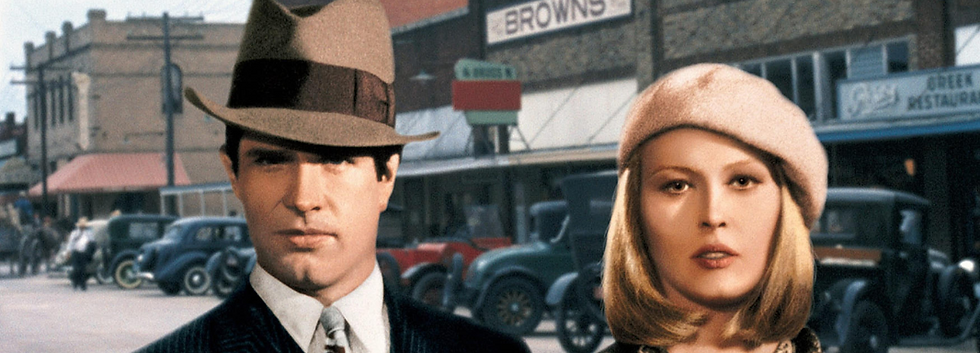
'Bonnie & Clyde' and New Sentimentality
February 1, 2023
By:
Hunter Friesen
Immediately upon its release, film critic Roger Ebert claimed Bonnie and Clyde to be alandmark in American cinema. The film attracted a love/hate relationship with critics, with the love side eventually winning out in the long run. Ebert was right in that Bonnie and Clyde was a milestone for American cinema, as this was one of the earliest and most successful films that embraced the idea of “counterculture." Through the use of their idea of new sentimentality, screenwriters David Newman and Robert Benton took Hollywood by storm by defying the oldways in favor of charging down a new path.
The idea of “new sentimentality” laid out by Newman and Benton tried to explain the cultural and generational differences that were taking place in America during the 1960s. The ways of Old Sentimentality, which preached about the good ol' days of American patriotism and love for others, were now fading away in favor of a more tough and self-empowering way of thinking. Bonnie and Clyde illustrated this new way of thinking in multiple ways.

The main factor that created controversy around Bonnie and Clyde, and for why it is apiece of new sentimentality, is the unrivaled amount of violence inflicted by and onto the characters. Obviously, with a movie about bank robbers, there has to be a few shootouts thatwould get butts in seats. Bonnie and Clyde does deliver the shootouts that one would expect and pay to see at the time, but it does it in such a way that it sucks out all the guilty joy we get out of watching it. Instead of dropping dead instantly after one shot, characters bleed and writhe around in extreme agony. The old way of gun violence was quick and didn’t allow for us to think aboutthe ramifications. This new way forces us to see the effects violence has on every day people, the physical damage it does to the person hit and the emotional damage it does to the people watching it, for which we the audience must participate. This idea somewhat borrows from the French and Italian new-wave of thinking that placed importance on telling stories that reflected our reality that is filled with real people.
The violence comes to an incredible climax at the very end when our titular characters are gunned down in a hail of never-ending bullets. All you can do during the scene is sit there incomplete shock as their bodies are riddled to shreds. It’s not fun to watch or heroic in any nature. The old sentimentality had gun-toting heroes like Humphrey Bogart and John Wayne who killed quick and clean. They symbolized a time when America was in a righteous war to protect theworld from the Nazis. Bonnie and Clyde is the new idea that violence is something that lingers inthe moment and for many moments after. America was in Vietnam at the time, a war that waspropelled by American self-interest.

Apart from violence, another element that must be delivered to sell a movie is sex. Like violence, sex was shown in only its tamest forms in film. Hitchcock famously had to dance around the subject in Notorious by having his characters kiss and peck at each other over time. Bonnie and Clyde engages with sex on a much more open scale. Bonnie and Clyde have sex multiple times throughout the film and even discuss it with each other. It’s a part of their relationship as opposed to being kept under the rug like before. We even get a tiny storyline about Clyde being impotent and then finally overcoming this. The idea of impotence before that time wasn’t one to be discussed as it clashed with the idea of what a real man was. John Wayne would never be impotent! The idea of new sentimentality changed what it meant to be a man, filled with imperfections and perversions.
Bonnie and Clyde marked the mainstream beginning of new sentimentality within cinema. Through its unflinching approach to violence and sex, the film sparked a debate that isstill being felt today. As Ebert said, the film was made in 1965 about people in 1934, but it will always be made for us here and now.




